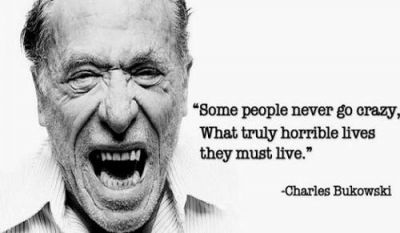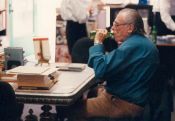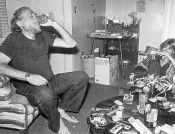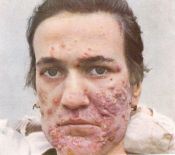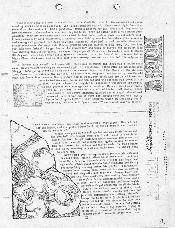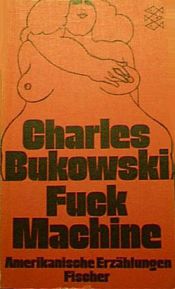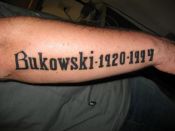Difference between revisions of "Charles Bukowski"
| (3 intermediate revisions by the same user not shown) | |||
| Line 254: | Line 254: | ||
'''Timeline|Featured article June 1, 2009''' | '''Timeline|Featured article June 1, 2009''' | ||
[[Category:People]] | |||
[[ | {{People}} | ||
Latest revision as of 00:54, 3 May 2022
"Don't Try " --Bukowski should have taken his own advice.
Henry Charles Bukowski was a misogynistic, drunk, and violent bum who is considered an American Icon and anti-hero by just about every 15 year-old misunderstood teenage boy who didn’t make the football team. He was loud, boorish, self-aggrandizing, and often the main character of his own novels and short stories. This arrogant behavior was due, in part, to his massive ego, but it should also be noted that being a social recluse and having absolutely no skills as a vocal communicator greatly exacerbated his need for acceptance through his written works.
Youth
Born in Germany in the 1920s, his parents soon grew tired of being poor and unwashed, so they soon scraped up enough money to take a boat to the United States. Upon reaching America, they languished in Baltimore until they could again raise enough cash to move to Los Angeles. There, they enrolled young Charles in school and began a long series of financial ups and downs that would shape how Charles would feel about his father for the rest of his life. Charles's father was often out of work, but he was a stern man who would often beat Charles for not having gumption (where work ethic was concerned) or for getting bad grades in school. The older Bukowski equated American success to being motivated, educated, and cunning; a group of traits that he did not himself have. He wanted his dimwitted son to emulate these things so that he would grow up to be a Jew who could “afford any car on the lot, should he so desire.” Sadly, this did not have the intended effect, in the end, all it did was alienate father and son, and push young Charles into a bottle.
Acne
While in high school, Charles typified the average underachieving dipshits that populate most of American preparatory schools. He was awkward, he had no skills when it came to sports, he was very large and mean looking for his age, and girls did not like him. On top of all of these normal teenage maladies, he contracted Acne so bad that he would have to spend many years going to doctors to remove huge boils that would explode on his skin. Due to these outbreaks, Bukowski would have scars for the rest of his life; a point that his later literature would take great pains to point out, as if Freddy Kreuger-lookin acne was a “Red Badge of Courage”, or a cross to bear.
Alcohol Experimentation
Because he did not have success with women, Charles, like most boys of his age experimented with alcohol. He did so by stealing beers from his father or sharing beers with other neighborhood boys who had stolen beers from their fathers. After his first drink, Bukowski was said to have uttered this famous line: “This is going to help me for a very long time.” It is not known if Charles actually said this, but he has quoted it over and over enough times to make everybody believe it anyways. Whoever first uttered the line is not important, the truth of the line is the real epiphany; Charles would be a drunk for the remainder of his life, often battling the problem in hospitals.
College, Jail, and the Army
Charles Bukowski WAS NOT A GAY NAZI. Now, GET A LIFE! -- Somebody should take their own advice.
Charles graduated with the other nameless machine-like children that were in his class, and like them, was accepted for enrollment by the Los Angeles City College. He “bummed around there for a few years” before finally dropping out in favor of drinking booze. This plan backfired on him because while he was in college he had joined a group of Nazi sympathizers for shits and giggles. This had the adverse effect of putting him on an FBI watch list. Once he had dropped out of school, he was quickly arrested and jailed for draft dodging. He spent a total of 17 days in jail learning jailhouse-craft like pin tattooing and shooting craps until he was approached by a draft board officer who told him: “You aren’t staying here. You take a test, pass it and you are in the Army, or you fail it and we release you out on the streets.” With choices like that, Bukowski failed the psychological portion of the test on purpose, gaining a 4-F status and meaning that he was unfit for military duty. He was released soon later and would begin his long career as being a homeless bum that drank for a living and sometimes scratched out poems on cardboard boxes when he was feeling particularly “artistic.”
Early Career
After leaving jail, Bukowski entered what could be considered his “formative years,” owing to the fact that he spent a great amount of time “forming” a persona that emulated Ernest Hemingway. He would drink, he would fight and he would gamble, he would attempt highbrow culture, he would attempt sports. All of these things, with the exceptions of drinking and gambling, would turn out to be far too taxing for him to bear so he settled into meaningless jobs (like building frames for artwork) that required little skill and had bosses who drank as much as he did. When his money ran out, he would skip town (leaving several open bar tabs unpaid) and make for the next place he could find unskilled labor. In this way, Bukowski managed to criss-cross the United States until he finally made his way back to Los Angeles.
Post Office
During the holiday season, the United States Postal Service was hiring temporary positions to carry the increased Christmas mail. Bukowski applied and to the surprise of all (including himself), he was hired to carry mail door-to-door. He managed to keep this job for two and a half years prior to quitting because the job was interfering with his alcoholic intake.
First Attempts at Writing
|
|---|
At this same time, he also managed to get a couple of ham-fisted and clumsy stories published in worthless literary rags. Because of his lack of success at this point, he quit writing for ten years and grew more reclusive and angry. He also managed to have a few marriages and several thousand affairs with fellow alcoholic women. One of these affairs led to the birth of his only child: Marina Louise Bukowski.
Full Time Writing
At the end of his ten year hiatus from writing, Bukowski was thrown back into literary circles when he began writing poetry about the death of a friend. He met small initial success, but because of the disgusting nature of his stories, often dealing with rape, abuse, toilet paper and drinking, his small success collected an underground following that is still around to this day, despite his death in 1994. While rejuvenating his writing, he somehow conned a small press (Sparrow Press) to publish his works and after that, he again criss-crossed the country; this time giving speeches about writing and publicly reading excerpts of his stories, poems, and novels.
Despite this underground fame and lucrative contract with Sparrow, Bukowski had very little success with local press. He started or wrote for several literary magazines, but they all fell short and went under, owing to the fact that nobody wanted to hear some old bum complain every day in his own newspaper column.
FBI
At this point in his career, the FBI re-opened the file on Charles Bukowski. Because of his association with underground personalities and underground newspapers and also because of his radical attitudes and constant use of foul language he was noted as a person of interest by the federal government. Some time later, after his death, full dox were dropped on Bukowski.
Below are some images taken from that file:
Bibliography
"as a writer he gave us good books but why he was pretending to be tough when the only reason he run from home after college was war. simple he was a coward."
--Discussing Bukowski's writing...I think.
Bukowski wrote over a thousand poems and around one hundred short stories. He also attempted novel writing, but they came off as really long and more boring versions of his short stories. Even though he had little success writing novels (he published seven of them) while he was alive, this failure bloomed into a major triumph for Sparrow Press after the launch of the 1986 movie “Barfly” which was written by Bukowski and starred Mickey Rourke. After seeing two hours of some good-for-nothing fighting, drinking, and fucking Faye Dunaway, his underground following exploded into full-on hero worship and Bukowski was finally a financial success, even though he had only a few remaining years to enjoy it.
Below is a list of his works, should you choose to partake:
Novels
* Post Office (1971) * Factotum (1975) * Women (1978) * Ham On Rye (1982) * Barfly (script) (1984) * Hollywood (1989) * Pulp (1994)
Poetry
* Longshot Poems for Broke Players (1962) * It Catches My Heart in its Hands (1963) * Crucifix in a Deathhand (1965) * Poems Written Before Jumping Out of an 8 Story Window (1968) * The Days Run Away Like Wild Horses Over the Hills (1969) * Mockingbird Wish Me Luck (1972) * Burning in Water, Drowning in Flame (1974) * Love is a Dog from Hell (1977) * Play the Piano Drunk Like a Percussion Instrument Until the Fingers Begin to Bleed a Bit (1979) * Dangling in the Tournefortia (1981) * War All the Time (1984) * You Get So Alone at Times That It Just Makes Sense (1986) * The Roominghouse Madrigals (1988) * Septuagenarian Stew: Stories and Poems (1990) * The Last Night of the Earth Poems (1992) * Betting on the Muse: Poems and Stories (1996) * Bone Palace Ballet (book)Bone Palace Ballet (1998) * what matters most is how well you walk through the fire. (1999) * Open All Night (2000) * The Night Torn Mad with Footsteps (2001) * Sifting Through the Madness for the Word, the Line, the Way: Book 1 (2003) * Sifting Through the Madness for the Word, the Line, the Way: Book 2 (2003) * Bukowski: New Poems Book 3 (2004) * The Flash of Lightning Behind the Mountain (2004) * Slouching Toward Nirvana (2006) * Come On In! (2007) * The People Look Like Flowers At Last (2007) * The Pleasures of the Damned (2007)
Short story collections
* Flower, Fist, and Bestial Wall (1960) * Run With the Hunted (1962) * Cold Dogs in the Courtyard (1965) * Confessions of a Man Insane Enough to Live with Beasts (1965) * At Terror Street and Agony Way (1968) * A Bukowski Sampler (1969) * Erections, Ejaculations, Exhibitions, and General Tales of Ordinary Madness (1972) * Mockingbird Wish Me Luck (1972) * South of No North (1973) * Hot Water Music (1983) * Tales of Ordinary Madness (1983) * The Most Beautiful Woman in Town (1983) * All's Normal Here: A Charles Bukowski Primer (1985) * Portions from a Wine-stained Notebook: Short Stories and Essays (2008)
Nonfiction
* Notes of a Dirty Old Man (1969) * Shakespeare Never Did This (1979); expanded (1995) * The Bukowski/Purdy Letters (1983) * Screams from the Balcony: Selected Letters (1993) * Living on Luck: Selected Letters, volume 2 (1995) * The Captain Is Out to Lunch and the Sailors Have Taken Over the Ship (1998) * Reach for the Sun: Selected Letters, volume 3 (1999) * Beerspit Night and Cursing: The Correspondence of Charles Bukowski and Sheri Martinelli (2001)
Writing Style
"detailed depiction of a certain taboo male fantasy: the uninhibited bachelor, slobby, anti-social, and utterly free"
--Some critic giving Bukowski the literary equivalent of a “Dutch Rudder.
Bukowski writes about drinking, fucking, and boxing. When he can't seem to fit these central themes into his writing, he includes horse racing as well. His tone has been called “gritty” by some critics, while it has also been called “boring and lame” by others. Most teenage boys can identify with his central characters because they fantasize constantly about being able to drink and fuck women. His main characters are almost always homeless bums who somehow become heroes through drinking, gambling or fucking. His antagonists are the rich, the successful, and the beautiful, illustrating Bukowski’s scorn and jealousy for such people.
His subject matter often deals with how he has learned to “live on luck” while on the streets and back alleys of Los Angeles, here are examples of every story Bukowski has written:
- He was lucky to have won that boxing match.
- He was lucky to have fucked that blonde with the huge ass.
- He was lucky to have found that twenty dollar bill in his shoe, now he can go out and buy a bottle of cheap port and a few stinking cigars.
By reading the above list, you have pretty much read every Charles Bukowski story ever written. The only difference between one short story and another are minor details such as:
- How he took a nasty shit prior to the events in the story.
- How he ate a hard-boiled egg prior to the events in the story.
- How he has small hands, but people seem to like his ass.
- He is visited by an annoying neighbor.
- He slaps a girl, then he fucks her.
If you mix all of these subjects, you will have an excellent working knowledge of Charles Bukowski, and can now probably dazzle literary snobs at parties.
Legacy
'It is written at roughly an eighth grade reading level --A critic discussing Bukowski.'
During the tail end of Bukowski's life and certainly after his death, counterculture embraced him as a lost step-child. Because of this, Bukowski is often taught or discussed alongside other better authors, however this does not stop your average hemp-huffing hippy from going off the deep end when it is speculated that Bukowski might just suck.
'Are you sure you joined the right forum? Perhaps you should read: "All The Assholes In The World And Mine." -- Bukowski fan boy'
Most Bukowski communities are very uptight and snobish when it comes to their favorite writer. To merely mention Bukowski in a bad light will move an entire forum against you and you will find yourself ignored, warned and banned in short order. But being banned from highbrow forums does not stop literary critics. Some people cannot stand Bukowski and his inebriated scrawling. / This guy has the balls to stand up and call Bukowski's work the junk writing that it is. I hope he has life insurance, the rabid pack of Bukowski assholes is on it's way. If the mob wont shut him up, perhaps a smear campaign will...
'"a catholic taste in literature"--I'm pretty sure that means he bangs little boys... --Mudslinging 101'
There are several communities that are based on the drinking and lifestyle of Charles Bukowski: Most notably, the Charles Bukowski Memorial Drinking Club which will allow you to re-enact your favorite moments in the life and writing of Charles Bukowski. Some of these moments include: vomiting in the gutter, getting into a violent altercation with the police, slapping hookers, and losing all of your money on horse races. This collection of drunks actually encourages its members to not read Bukowski, just act like an outrageous drunk.
Quotes
With any polarizing figure, there will be many quotes both pro and con. Bukowski, however, is not a polarizing figure. In a day and age when counterculture hippies will latch on to anything "edgy" or what they consider "against the establishment," Bukowski lucked out by happening to be in the right place at the right time.
Gallery
How To Troll
While many people in life strive to become something more of a drunk, barfly, homeless, unsuccessful, lonely, gambling, womanizer who could barely write Bukowski embodied these things. Luckily for you because of those traits it is very easy to offend a bukowski fanboy Simply say any of the following:
1) Bukowski was actually a really nice guy who knew what he wanted in life.
2) Bukowski wasn't a drunk he just enjoyed a drink
3) Bukowski was a good writer
4) Bukowski once helped an old lady cross a street
5) pew pew Bukowski Pew Pew
generally saying anything positive about him will illicit some sort of response from the fan boys, it's easy. Try it!
Video
YouTube is literally smothered in old video clips of Bukowski offering his opinion. Because of this, I will only link one, but by viewing them, you should begin to understand Bukowski a bit better; the man hated women and he hated just about everybody else, but most of all, he hated himself far more than others. Sometimes he would own up to his own self loathing, but most of the time he just blamed his father.
/ Here is a link to most of his other videos.
See Also
External Links
- Holy Shit a huge Bukowski community to troll
- Discussion of Bukowski's lack of taste in music. Complete with misspellings.
- Fansite with absolutely no content whatsoever.
- / I can recall well-turned lines by Creeley, Barbara Guest, Levertov, but none by Bukowski.
- Bukowski poetry contest where many do not have a very good opinion of Charles.
- / Interview with Linda Bukowski.
Timeline|Featured article June 1, 2009
• Elon Musk • Charles Bukowski • Darwin The Wrestler • BallSac • Gary The Tow Truck Driver • Ron Perlman • Mark Zuckerberg • NPC • Salman Rushdie • Jeff's Sex Doll • Dan • Donics • Thomas Paine • Jim Rome • Gummi • Columbine Anon • Johnny Depp • Wikipedia Editor • Andre • StoneToss • Bloggin.space • DEAFTONEGOES • Shawn's Shed • Kirk Hammett • Sergei Boobtitsky • Certified Plummer • Mr. Mitchell • Grillo • Cliff Is Back • Albert Bourla • Chuck Berry's Breakfast • Justin Wilson • The Vegan Teacher • Steven Crowder • Weishaupt • John The Maintenance Guy • Ye • Pupienus • You • Blanche Dumas • Zoomers • Joe Buck • NEET • Trump • The Legend Of Jeff • Bam Margera • Faye Reagan • Vivek • JFK • Suggs Diggs • Uncle Roger • Matt Petgrave • Robert Earl Hughes • Tom Bosley • Ian Murdock • Penis Man • Warwick Davis • OJ • Taylor LaVey • Ben Garrison • Kirk Herbstreit • The Hulk • Nancy Pelosi • Adam Ragusea • Anne Heche •
